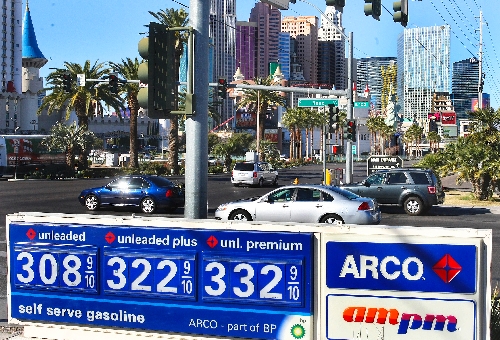Oil prices rise, but Las Vegas not sweating — yet

Las Vegas’ visitor industry has largely shrugged off the rapid run-up in crude oil prices that began last the summer.
But Mark Johnson is starting to feel the pinch.
“Fuel is definitely impacting things now,” said Johnson, owner of LD Tours charter bus service. “We’ve had to change our prices some because the cost has become so high that we can’t absorb it any more.”
Maverick Aviation has so far shied from imposing fuel surcharges like other aerial tour operators, except for a $10 surcharge on helicopter flights out of McCarran International Airport. But an executive is eyeing aviation fuel prices nervously.
“We are doing everything possible to hold the cost down because this is a very price-sensitive market,” said marketing director Bryan Kroten, referring to plane and helicopter flights to the Grand Canyon. “We have been bearing the brunt of fuel increases for three or four months now.”
The city is still fighting its way through several obstacles, including a glut of new hotel rooms and still-tight discretionary spending, to show a modest recovery in key measures such as total visitation and room rates. Now, oil prices have emerged as a dark cloud on the economic horizon.
“I think the general public has become used to oil prices,” said Alexandra Epstein, executive manager of the El Cortez. “We are seeing gradual increases in customers and they are slightly more confident in the economy.”
Oil would have to reach a range of $120 to 130 a barrel and stay there for a while to cause the economic damage inflicted in 2008, when the price peaked at $145 a barrel, said Jeff Thredgold, the Utah-based economist for Nevada State Bank. One oil index briefly hit $100 a barrel on Jan. 31, as traders grew increasingly jittery about Egypt’s political upheaval. Prices on the New York Mercantile Exchange have hovered around $90 since the start of the year but have risen 27 percent since Sept. 1.
“Nobody will cancel a trip to Vegas because gas is $3.05 a gallon instead of $2.85,” he said. “The first time the price went way up, it had a big punch. The second or third time, it’s an aggravation but not much of an impact.”
Executives at Allegiant Travel Co., which saw its net income in 2010 decline due largely to a fuel bill that swelled much more rapidly than other expenses, think the impact has already arrived.
‘”Without a doubt, this is a really big factor for the local economy,” Allegiant President Andrew Levy said. “Airlines don’t see Las Vegas as particularly profitable. Fuel prices will absolutely result in less seat capacity into Las Vegas than there would have been otherwise.”
The number of seats landing at McCarran is critical because about 42 percent of visitors arrive by air and generally spend more than people who drive, Las Vegas Convention and Visitors Authority research shows.
Allegiant has for a second time trimmed its projected second-quarter flight schedule to counter rising fuel costs and said it could to it again if prices continue escalating.
In their fourth-quarter earnings conference call, US Airways executives said oil prices likely would not affect the airline’s peak summer schedules.
“However, as we move into the fall schedule, we are much more likely to reduce capacity with oil at that these levels,” Executive Vice President and Chief Financial Officer Derek Kerr said.
Through June, the airline schedules at McCarran show about 2 percent more seats than 2010, the first increase since 2007. Union Gaming Group principal Bill Lerner sees this, along with rising traffic counts on Interstate 15 at Primm, as evidence that oil prices have not exacted a toll on the local economy.
Several other airlines, including United, Delta and Southwest, the largest carrier at McCarran, all talked about having implemented at least three across-the-board fare increases in the past few months to recoup their extra fuel costs. Fuel surcharges have been added to international flights.
Southwest estimates current oil prices will tack an extra $650 million to its fuel bill this year, which could mean even more fare hikes.
“(Our) 2011 plan always had a fuel headwind, so certainly we have got to cover the cost increases with further revenue improvements (fare increases),” said Laura Wright, the airline’s chief financial officer.
Rising airfares can push down room rates included in package deals to keep the overall price the same, Lerner said. But it generally is not a one-sided adjustment, he said.
The more people spend to get here, the less they will have once they arrive, said Sung Won Sohn, a Los Angeles-area economist who sits on the board of Western Alliance Bancorporation, parent of the Bank of Nevada. As rising oil prices consume more discretionary income, he said, “It is definitely a negative for the leisure industry of Nevada.”
Should gasoline pump prices hit $4 a gallon, “then it really begins to hurt,” he said.
Contact reporter Tim O’Reiley at
toreiley@reviewjournal.com or 702-387-5290.












